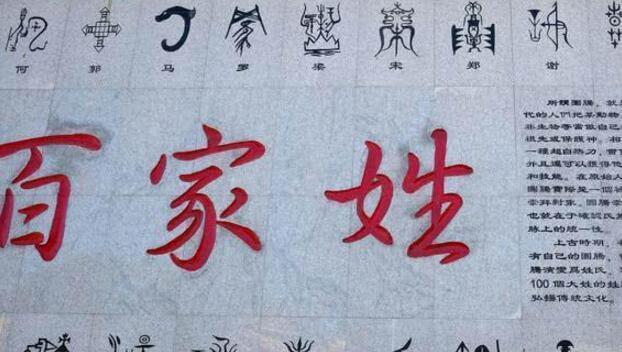Guide:
"Zhao Qiansun Li, Zhou Wu Zheng Wang." Feng Chen Chuwei, Jiang Shen Han Yang. This sentence is the beginning of the hundred family names, and I believe that many people are not strangers. According to historical records, the first hundred family names appeared in the early years of the Northern Song Dynasty, and have been handed down for more than a thousand years. After more than a thousand years of development and evolution, there are already more than a hundred family names, and the latest statistics are 504.

In ancient times, China was a country of etiquette, after strangers met, if you want to ask other people's surnames and names, generally will add "your noble surname" in front of the front to show respect, and the answerer can not directly answer "surname Li, surname Wang", will modestly say a sentence "free of your surname Li, free of your surname Wang".
However, in the hundred family names, there are also two special surnames, when answering others, directly say the surname, do not add the word "free of expensive", if added, but can not play a good role, and even become the laughing stock of others, then which two surnames in the end?
The first, surnamed Kong, has been hereditary knighthood for more than 2,000 years by the descendants of Confucius, and the honor is unmatched.
As the founder of the Chinese Confucian school, Confucius was highly respected by successive rulers, and his posthumous title also rose, from the Most Holy, the Most Holy Master, and the Dacheng Most Holy Wenxuan Wang Ancestor, all the way to the "Master of All Ages". After the establishment of each feudal dynasty, in order to flaunt its orthodox status, not only did confucius have great respect, but even Confucius's descendants were added to the rank of knight.
For example, after Liu Bang established the Han Dynasty, he immediately ordered people to look for Confucius's descendants, and finally the chancellor found Confucius's 8th grandson Kong Teng, Liu Bang was very happy, and crowned him as a worshipper, and hereditary resignation. From the beginning of the Han Dynasty, although the title of the Kong family will change, its status has never changed, and by the Song Dynasty, the glory of the Kong family has reached its peak. Emperor Renzong of Song deliberately crowned the descendants of Confucius as the Duke of Yansheng, becoming the highest nobleman in hereditary succession, starting from the Song Dynasty to the Republic of China, and the hereditary succession of the Duke of Yansheng was more than a thousand years.
In the Song Dynasty, Yan Sheng Gong was equivalent to the Eight Pin Officials, and by the Ming Dynasty it was already a pin and ranked first among all the courtiers. Kong, who has been prominent for more than 2,000 years, naturally deserves a "noble" word, on the contrary, if you say "nobility surname Kong", then others will think that you are contemptuous of the Most Holy Ancestor Confucius, and may be ridiculed.
The second, surnamed Zhang, the original family of the Jade Emperor, naturally deserves a "noble" word.
According to the latest statistics, there are about 84 million Zhang surnames in the country, and the surnames of Li and Wang are called the three major modern surnames. Regarding the origin of the Zhang surname, it is now recognized that it is from the Ji surname, which is a descendant of the grandson of the Yellow Emperor, originating from the Qinghe River in Hebei, so there is a folk saying that "the Zhang clan of the world is out of the Qinghe River".
The reason why the surname Zhang can not be said to be "free of nobility" is mainly because the Jade Emperor was surnamed Zhang before Chengxian, and there are many versions of his specific name. But no matter what the name is, the surname Zhang is certain. In feudal society, the Jade Emperor was the lord of heaven and earth, and who dared to say that heaven was not honorable was equivalent to disrespecting heaven and earth.
In fact, according to Taoist writings and mythological records, the status of the Jade Emperor was also established during the Song Dynasty, when Song Zhenzong revered the Jade Emperor as the leader of the gods of the Heavenly Dao, so before the Song Dynasty, the surname Zhang should be said to be exempt from nobility, but after the Song Dynasty, no one said it, because the ancients were feudal, worried that contempt for the heavens would be punished.
In addition to these two fixed surnames, in feudal society, there will be a situation that can also not be said to be "free of nobility", that is, the same surname as the emperor of the dynasty, as a royal surname, it is naturally extremely honorable and no one dares to despise it. For example, the Surname of Liu in the Han Dynasty, the Surname of Li in the Tang Dynasty, and the Surname of Zhu in the Ming Dynasty.
Reference: "Examination of the Origin of Hundred Family Names"